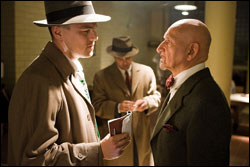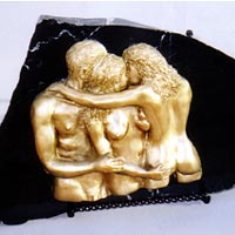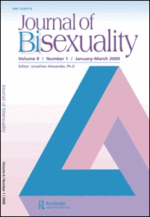A Gut Feeling: Anal Pleasure, Holistic Sexual Health, and Interpretations of AIDS
Serena Anderlini-D’Onofrio
Part # 2
“G,” I said as soon as we resumed the conversation, “ I’m not sure I can follow the connection between Gaia and anal pleasure, remember? Can you get into some more detail?”
“Sure. Let me start with a question. Did you know that Freud said that anal pleasure was the richest pleasure one could feel, and that experiencing this pleasure was healthy?”
“Really? How do you know?”
“Well, my father used to say that when I was little,” G rushed to explain, “and then I read it in recent books that study the subculture of barebacking in San Francisco.” [1]
“I wonder if Freud would still say that today, when we know how dangerous barebacking is.”
“I bet he would,” G asserted, undeterred.
“How can you possibly say that?” I exclaimed.
“Because in his view what is most pleasurable is what is most repressed, and repression is bad for you because it’s unnatural–even though sometimes necessary for social peace. He thought that the pursuit of pleasure was natural and good for you—I mean healthy.”
“So, because anal sex was so repressed in his time, this made him think that it’d be most pleasurable?” I asked.
“I suppose,” replied G.
“But barebacking can kill you! Can’t it?” I probed, concerned.
“Only if you do it excessively and in unnatural ways, Freud would probably say. Today we are so prejudiced against natural anal sex because we come from over twenty years of thinking that AIDS comes from infections passed through the anal mucous.”
“All right. So, what’s a ‘natural’ way to have anal sex?’”
“A way that’s holistic: A way that enhances the main function of the rectum, which is of course, elimination of what’s unnecessary to the body’s homeostasis.”
“How can anal sex be holistic?” I asked, puzzled.
“When one allows for a gradual opening of the sphincter, when one does it consciously and not under the effect of some substance, and when one doesn’t do it so violently or frequently as to damage the integrity of the organ and its lining and mucous.”
“Ok. I suppose one can do that.”
“Why just suppose?”
“Have you tried it?” I asked.
“You know I enjoy anal sex, and I’ve always done it naturally,” G affirmed. “Holistic sexual health is very important to me. I always expect respect for my body when I have sex.”
“All right. I get the point about anal pleasure. But how can this enhance the main function?” I asked, impatient.
“It helps one discover anal pleasure, develop a taste for it. Then having a bowel movement becomes a pleasure too, and the body, who seeks pleasure, does it more naturally and willingly.”
“OMG. I think of bowel movement as gross–not pleasurable!” I exclaimed.
“Well, that’s the problem, Freud would say,” G replied, amused.
“Really? Have you thought all this up, or did you read it somewhere?” I asked, ruffled.
“I always read. And I’ve been accused of holding heretical views in relation to this, so I research and think,” G replied, unperturbed.
“All right. All right,” I calmed down. “Tell me more about it. Does this have anything to do with ‘finding the cause of AIDS?’”
“It does if you define AIDS as the depletion of the gut as a bioregion of the body that’s essential to the body’s health,” declared G, peaceful.
“But then this depletion can be related to anal sex?” I asked, curious.
“Yes it can, if it’s not practiced in a holistic way.”
“You mean, if it’s done violently, or excessively?”
“You’re getting there. Turns out if anal sex is not practiced in a holistic way, it can cause intestinal dysbiosis, which happens when the biological function of one’s gut is compromised or disabled altogether.”
“If the gut is not respected, you mean?”
“Yes.”
“If it’s abused in some way?”
“That’s a way to put it,” G said.
“Thanks. I get it,” I offered, appeased. “Did you find out about this recently?”
“I told you. It’s from the guy who found the cause of AIDS. I found a series of three videos, all about anal sex and how it can be done holistically. Or–to be more specific–about how doing anal sex in ways that are not holistic can cause AIDS.”
“All right. And where did you find the videos?” I asked.
“On YouTube. They are from a presentation at the latest Rethinking AIDS Conference, in Oakland, where all those who are seriously thinking about sexual health in holistic ways got together to discuss what other hypothesis could be pursued to explain AIDS better than we do today.”[2]
“Woooooow. That’s awesome, I exclaimed. “And how does the presenter know about this? Is s/he a doctor? A scientist? A Nobel laureate?”
“No,” G replied, serene. “His name is Tony Lance, and he is a perfectly healthy gay man who tested ‘poz’ 13 years ago, has refused conventional treatments, and has done his own research.”
“How interesting. Vernacular science, eh?”
“Yes, science by the people and for the people. Very symbiotic, very Gaian indeed. He claims the gut is an ecosystem.”
“Is it?”
“You bet,” G replied, eager. “Any system that processes life’s energy is an ecosystem. He compares the gut to a ‘rainforest, rich in species and interdependencies.’ Anything you do with it needs to support the system, including anal pleasure. If you abuse it, you can destroy it.”
“And what could one do that would have that effect?” I asked.
“All kinds of things that undermine its biological function–but not anal sex per se.”
“What do you mean?”
“Well, think of all the cultural obsessions that come from excessive emphasis on allopathic medicine and are opposed to holistic health.”
“That would involve practicing medicine as war against disease agents rather than as support of the body’s inherent balance and homeostasis.”
“Yes.”
“But how does that apply to anal pleasure?” I asked. “I’m afraid I need some concrete examples.”
“Ok. Back in the days before AIDS, many gay men who went to the bathhouses for anal pleasure did wide spectrum antibiotics on a regular basis to stave off the flu and other stuff one would get there. It was a way to combat microbes as if they were enemies. But in reality most microbes are very valuable symbiotic friends. So those medicines destroyed the friendly bacterial flora that lines the gut and makes it able to absorb nutrients. And when the gut fails to do its job you can end up with a mild case of intestinal dysbiosis.”
“Woooow. Profound!” I exclaimed. “And what would be a holistic way to handle that?”
“Well, doing anal pleasure only to the extent that is does not expose one to excessive flu microbes from one’s partners, for example. Doing it in moderation and while one builds up one’s immune system with good nutrition as well.”
“Ok. So holistic sexual health is not a way to condemn pleasure, but rather a way to enhance it and promote healthier and more conscious ways to enjoy it.”
“Yes,” G agreed.
“Is there more to it?” I asked, curious.
“Of course,” G replied. “But I gotto go. Can we talk about it in a couple of days?”
“Yes, call me when you’re ready.”
“Great!”
[1] Tim Dean. Beyond Sexuality. University of Chicago press, 2000. (A study of Freud and Lacan in their deepest and less popular implications.) Unlimited Intimacy. University of Chicago Press, 2009. (An analysis of the subculture of barebacking in San Francisco.) Amazon.com: Beyond Sexuality Amazon.com: Unlimited Intimacy
[2] Videos of Tony Lance’s presentation at Rethinking AIDS. YouTube – Tony Lance
Disclaimer: This Tale does not constitute medical advice in any way. Readers are invited to consult their own healers and health care providers.
http://polyplanet.blogspot.com






